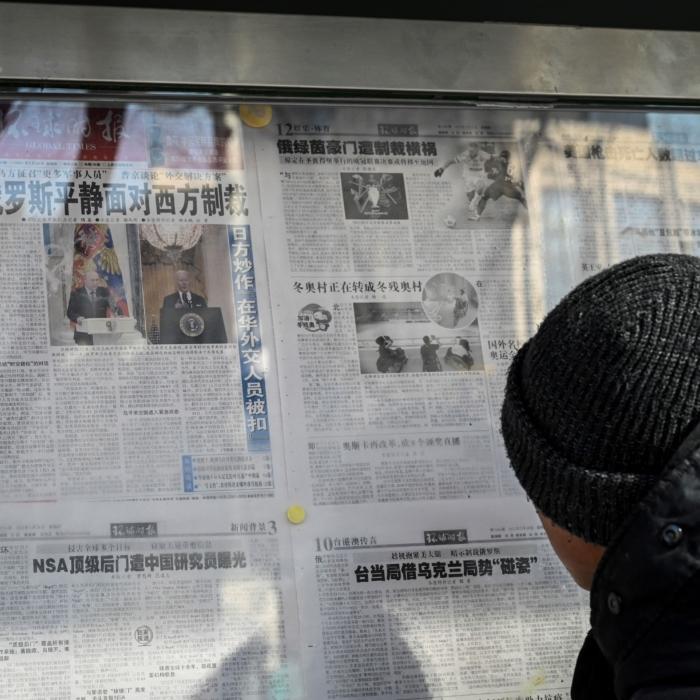The Chinese Communist Party (CCP) found new ways to harass foreign journalists working in China last year while continuing to use old tactics to stifle press freedom, according to a new report.
According to the report, China deployed unmanned aerial vehicles to monitor foreign journalists in the field for the first time in 2023.
“On a recent trip to two different provinces covering the link between climate change and extreme weather events, we were followed by multiple carloads of plainclothes officers,” an unnamed journalist with a European media outlet told the FCCC.
“Drones were sent out to follow and observe us when we got out of our vehicle to film/collect interviews. When we moved on foot to a spot, the drones would follow us.”
The unnamed journalist was one of 101 correspondent FCCC members who responded to the survey, which was conducted in the first two months of this year. The respondents represent news organizations from Asia, Europe, Latin America, and North America.
While several unnamed journalists were quoted in the report, the FCCC noted that the “vast majority of respondents” didn’t want to be quoted on the record due to “fear of potential retaliation against themselves or their publication.”
“This is a relatively recent development, and reflective of an increasingly hostile atmosphere for journalists speaking out about the state of press freedom in China,” the report reads.
Drones were not the only digital tools that the CCP used to surveil foreign journalists. According to the report, a majority of those surveyed believed Chinese authorities “had possibly or definitely compromised” their communications: 81 percent said their Chinese social media app WeChat, 72 percent said their fixed line or mobile phone calls, and 55 percent believed their home or office was bugged with audio devices.
Additionally, according to the report, 11 percent of the respondents said they received “suspicious text messages with verification or login codes they did not request.”
‘Endless Cat and Mouse Game’
An unnamed journalist with a European newspaper described the relationship between Chinese officials and foreign journalists as an “endless cat and mouse game.”The report quoted the journalist as saying: “Whatever strategy you try, the Chinese surveillance and security system adapts and closes the gap. Whatever strategies you use, the space for reporting keeps getting smaller and smaller.”
About 99 percent of those surveyed by the FCCC said reporting conditions in China “rarely or never met international reporting standards.”
Meanwhile, 81 percent said they had experienced interference, harassment, or violence while working in China.
“More than half (54%) of respondents said that they were obstructed at least once by police or other officials. Numerous respondents recounted having been prevented from filming, taking pictures or doing interviews, or being detained,” the report reads.
Many in China had refused to speak to foreign journalists. According to the report, 82 percent said they had interviews declined by individuals “who stated they were not permitted to speak to foreign media or required prior permission.”
“A significant shift in recent years has been observed where academic sources, think tank employees and analysts either decline interviews, request anonymity, or don’t respond at all,” the report reads. “In other cases, previously granted interviews are withdrawn after pressure from the authorities.”
The report also noted that Beijing had now deemed more areas “politically sensitive,” adding to previously known regions such as Xinjiang and Tibet. In 2023, these sensitive areas included regions bordering Mongolia, Russia, and Southeast Asia.
According to the report, 79 percent of journalists “experienced issues” trying to report from the region bordering Russia, while 43 percent had issues reporting from the Chinese border with Southeast Asian countries.
Foreign media outlets had difficulty obtaining journalist visas and residence permits for their reporters, the report said, noting that 32 percent said their bureau was understaffed.
“This problem is especially acute for U.S. media outlets, only one of which succeeded in gaining accreditation in 2023, replacing a journalist who had left China,” the report reads. “All other American outlets said they had been unable to bring in replacements for departing correspondents, let alone add more journalists to their bureaux.”
Based on its findings, the FCCC urged Chinese authorities to “relax restrictions on accreditation and allow more foreign journalists to travel to the country.”
“The club also urges Beijing to put a stop to the increasing monitoring and harassment of journalists on the ground as they work around China.”





